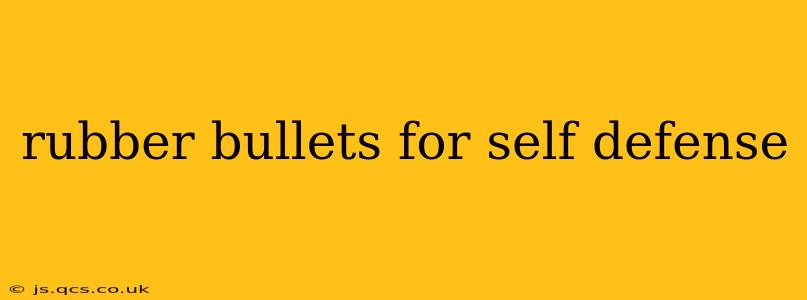The use of rubber bullets, also known as less-lethal projectiles, for self-defense is a complex issue. While marketed as a less harmful alternative to lethal firearms, their application requires careful consideration and understanding of both their capabilities and limitations. This guide aims to provide a comprehensive overview of rubber bullets for self-defense, addressing common concerns and misconceptions. It's crucial to understand that the legality and ethical implications of using rubber bullets for self-defense vary significantly by location. This information is for educational purposes only and should not be construed as legal advice. Always consult with legal professionals and local law enforcement before considering any self-defense measures.
Are Rubber Bullets Effective for Self-Defense?
The effectiveness of rubber bullets for self-defense depends on several factors, including the type of projectile, the distance from the target, the aiming accuracy, and the individual's physical condition. While designed to incapacitate rather than kill, they can still cause serious injury, including broken bones, internal bleeding, and even death in certain circumstances. Their effectiveness is significantly reduced at longer ranges, and their impact can be unpredictable. Furthermore, their effectiveness against multiple attackers is questionable.
What are the Legal Ramifications of Using Rubber Bullets for Self-Defense?
The legal implications of using rubber bullets for self-defense are highly dependent on your jurisdiction. In many places, the use of any weapon, even a "less-lethal" one, must meet the legal requirements of self-defense, including proportionality and the duty to retreat (where applicable). Using excessive force, even with a rubber bullet, can lead to criminal charges. Furthermore, the burden of proving self-defense often rests with the individual who used the weapon. It's crucial to understand that simply possessing a weapon doesn't automatically grant you the right to use it in self-defense.
Can I Legally Own Rubber Bullets?
The legality of owning rubber bullets varies considerably depending on your location. Some jurisdictions may have restrictions on the purchase, possession, or use of less-lethal weapons, requiring permits or licenses. Others might have no specific regulations, but the use of these projectiles in self-defense is still subject to the general laws concerning self-defense. Always check your local and state laws regarding the possession and use of less-lethal weapons.
What are the Alternatives to Rubber Bullets for Self-Defense?
There are several safer and often more effective alternatives to rubber bullets for self-defense, depending on the specific threat. These include:
- Pepper spray: A non-lethal option that can incapacitate an attacker temporarily.
- Personal alarms: These loud devices can deter attackers and alert others to your situation.
- Self-defense classes: Learning self-defense techniques can empower you to protect yourself without resorting to weapons.
- Situational awareness: Being aware of your surroundings and avoiding potentially dangerous situations is the best form of self-defense.
Are Rubber Bullets Better Than Other Self-Defense Options?
Rubber bullets aren't inherently "better" than other self-defense options. Their effectiveness is highly situational and contingent on various factors. The choice of self-defense tool should be based on a comprehensive risk assessment, considering the potential for injury to both the user and the attacker, and the legal ramifications of using such a weapon.
What are the potential injuries caused by rubber bullets?
As previously mentioned, rubber bullets, while designed as less-lethal, can inflict serious harm. Potential injuries include:
- Bruises and contusions: These are common, even at relatively short ranges.
- Fractures: Bones can be broken, particularly in areas like the face and skull.
- Internal bleeding: Impact can cause internal organ damage.
- Eye injuries: Impact to the eyes can cause blindness.
- Death: In rare cases, death can occur due to severe trauma or complications from the injuries.
This information is for educational purposes only and should not be considered a substitute for professional legal or medical advice. Always consult with the appropriate authorities before making any decisions about self-defense.
